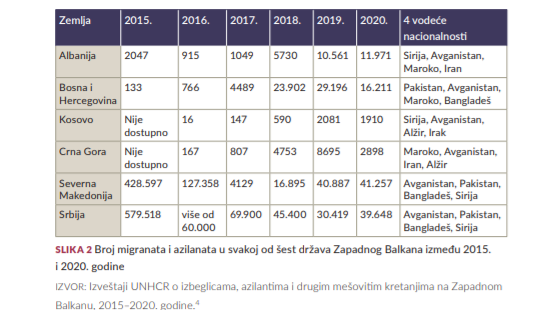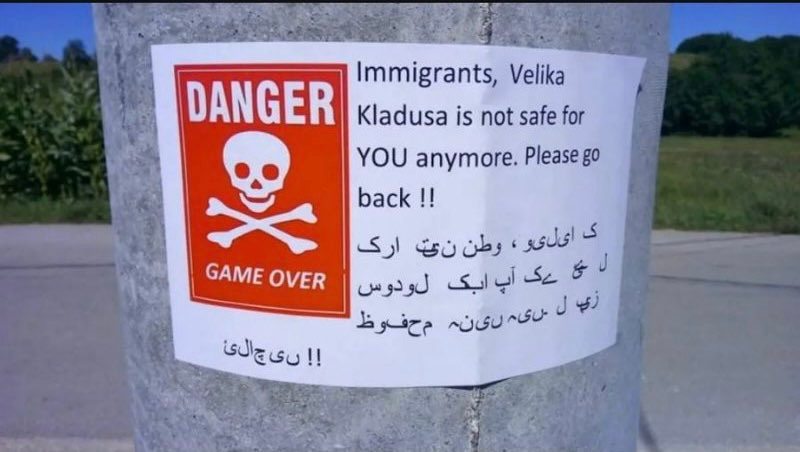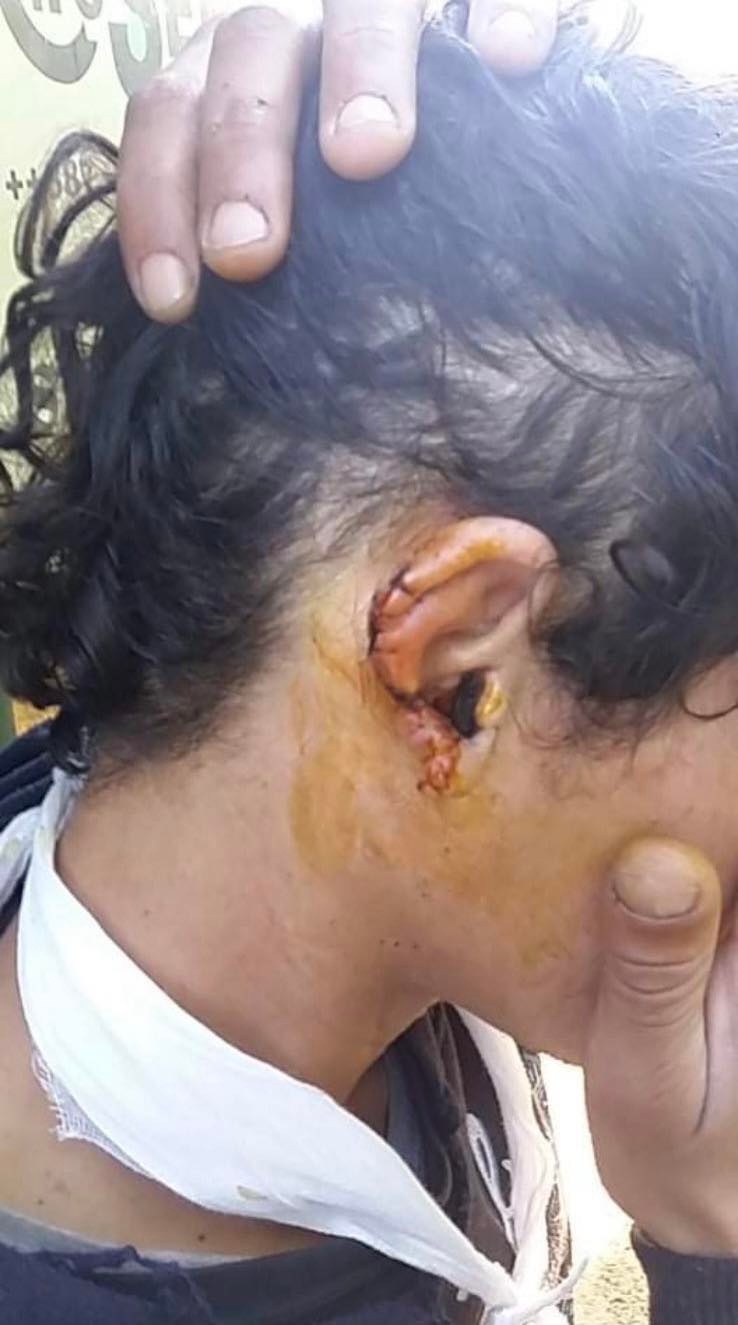Žurnal in English
MIGRANTS - PEOPLE WHOSE SUFFERING EVERYONE MAKES MONEY ON: Smugglers pimp boys as payment for crossing the border
Smuggling of migrants is closely related to human trafficking, which manifests itself in the form of labor exploitation (most pronounced in Herzegovina) and sexual exploitation, which, according to data collected so far, is most prevalent in Krajina. In one of the camps, a migrant from Algeria sexually abused two 15-year-old migrants at night. The case was reported to the police and an international organization, but their reaction was absent

At night, a migrant from Algeria, who was suspected of being connected with human smugglers, physically and sexually abused two 15-year-old migrants in his tent located in one of the camps in the Krajina region (exact location known to the editorial office).
"He was huge, and for a while, he took with him a dog he brought from Serbia. He would sometimes force both young men into his tent, and sometimes only one of them. They would stay there for the entire night. In the morning, when he came out of the tent, one of the young men (name known to the editorial office) would come out of the tent and go a little further from the camp, where he would sit all day, refusing food", Žurnal's sources reveal.
Meanwhile, with the help of friends, both young men managed to save themselves. Today they are safe in Italy.
It starts with smuggling, it ends with human trafficking
We learn that everything was reported to the police and one international organization (the name, also known to the editorial office), but their reactions were absent.
This is just one example of the horror that takes place in some of the migrant camps that Žurnal came across during its research on migrant smuggling. Most of our interlocutors do not want their identities to be published, for understandable reasons.
The smuggling of migrants is closely related to human trafficking, which manifests itself in the form of labor exploitation (most pronounced in Herzegovina) and sexual exploitation, which, according to data collected so far, is most prevalent in Krajina, through which most people move.
Anesa Agović, coordinator of the Global Initiative against Transnational Organized Crime for BiH (GI-TOC), points out that these two crimes are very often intertwined.
"The whole world is focused on smuggling migrants, but everyone forgets and does not think about human trafficking, and there is a very thin line between them. It starts with smuggling, and ends with human trafficking, whether it is labor or sexual exploitation", says Agović.
There are often situations where migrant-smugglers take 14-, 15- or 16-year-old boys, who travel alone, under their protection, and present themselves as their family members. While they have money, teenagers pay them for help to cross the border, but when they run out of money, they are sexually exploited and pimped. In that way, they pay the smugglers to cross."
Our interlocutors point out that something like this is difficult to discover, because none of them have documents, so it is almost impossible to prove whether teenagers travel with family members or not.
An aggravating circumstance is that the victims do not want to testify or report smugglers, not even those who sexually exploit them. They know that in that case they will stay in BiH and that they will eventually be returned to their home country. As long as they are silent there is hope that they will go further. In addition, they do not trust BiH institutions.
"According to my information, even when they are arrested, they place them again in the Reception Centers, but while the police come to pick them up to testify, they leave. In that way cases are not coming through, there are arrests, indictments, but no court epilogues ", Agović points out.
He held the migrant as a slave
Human trafficking is an even more lucrative business than smuggling. However, the number of indictments for this crime is significantly lower. In June last year, the BiH Prosecutor's Office filed an indictment against Mostar-based Ibrahimi Hushangi (1994), an Iranian citizen, on suspicion of exploiting the plight of an Iranian migrant with a three-year-old minor in BiH.
The accused took about 2,000 euros from her to secure her transport to EU countries, but instead kept and threatened her in order to clean the apartments and premises where he accommodated illegal migrants in order to continue smuggling them to EU countries.
Regarding human trafficking, the Prosecutor's Office of BiH has filed 44 indictments against 56 people in the last two years.
"Also, indictments have been filed in 13 cases against 58 persons for criminal offenses of human trafficking, in the form of an organized group for committing these criminal offenses, organized crime and association for committing criminal offenses," the BiH Prosecutor's Office confirmed.
This year alone, an investigation has been opened in 57 cases against 89 people for human trafficking. The Prosecutor's Office of BiH says that among the accused are persons of various profiles and occupations, and there were also accused police officers.
In September this year, Zejid Šabić (1969) from Velika Kladuša pleaded guilty to organizing a group or association to commit the crime of smuggling migrants. Based on the agreement, he was sentenced to three years in prison, and he was deprived of 3,300 KM, which he acquired by committing this criminal offense.
The Prosecution Office of Bosnia and Herzegovina recently filed an indictment against border police officer Bogoljub Dačević, who participated in the smuggling of 12 Syrian citizens, which he transported in an official van for 1,200 euros. He gave part of the money to his assistants Branislav Blagojević and Vladimir Matović from Foča.
Annual salary of about 50 million euros
Smuggling of migrants is a well-connected chain in which all actors benefit financially. It is a business in which between 34 and 50 million euros circulated through the Western Balkans in 2020 alone, according to GI-TOC.
The BiH Border Police tells us that while interrogating the smuggled persons, in order to gather evidence, they found out that the smuggler's tariff is around 6,000 euros for organizing trips from countries with high migration risk to some EU countries. In certain cases, this organization includes the purchase of fake travel documents, obtaining visas, transportation, airline tickets, accommodation, and other services.
An analysis by the Global Initiative states that 6,000 euros per person were paid by migrants from Pakistan, while the price for migrants from Iran or Afghanistan ranged from 3,000 to 3,500 euros per person to reach the EU.

Price list of services published by GI-TOC in its analysis
Most of this money goes to countries where the main smuggling chains are located. These are mainly Turkey and Greece, although in some cases the networks are managed from some European countries.
Smuggling networks have also been developed in Balkan countries, where mostly "small money" remains, which is taken by local taxi drivers, police officers, border police officers, and others involved in this crime.
The largest smuggling circles, within BiH, are located within the Reception Centers. Like their clients. The novelty is that lately there has been self-organization among migrants: those who have passed a certain route are making their own smuggling network.
Smuggling networks in a hotel in Velika Kladuša
Our sources reveal that some of the smuggling networks are located in Velika Kladuša, and everything is connected with a group of Turkish citizens, who are staying in a hotel with proper documents. Locals see that migrants enter the same hotel, stay one night and leave the next day.
A Žurnal’s source reveals that at one time there were many Afghan smugglers in Sarajevo who had an entire network. They arranged everything from Sarajevo. They knew exactly which border police officers were easy to bribe and at which border crossings they were located, how much to pay, when their shifts were, which routes to go, and the like.
One of the migrants from Velika Kladuša, our interlocutors reveal to us, crossed into Turkey four times. He found out which way to go, so he went back for others, took their money, and brought them to BiH.
They also cite as an example a guy who tried to cross the border with France 12 times and he only succeeded on his 13th try. After that, he kept coming back for others and transporting them across the border. Of course, he asked for and received money for that service. His destination was the UK where he has an aunt, but before that, he needed to make money and turned to smuggling.
"This is a business. Organized crime at work. It happened that they arrested the smuggler, but he denied guilt, saying he only wanted to help them. And those who are being smuggled, are silent, they protect them. And that is a problem during the prosecution, they protect each other, even though the migrant paid for the smuggling service ", points out Agović. She also reveals to us that smugglers mostly use messenger for the reason that when their phones are taken away, this application and all the data on it, can easily be returned, because it is installed with a name.
In its analysis of the flow of people, drugs, and money in the Western Balkans, GI-TOC categorized smugglers: fixers(those who fix, and those who solve other migrants’ problems), gate keepers (border protectors), and package dealers(people who offer arrangements). The latter earn the largest sums of money.
Fixers include less organized groups or individuals, mostly taxi drivers who transport migrants from one city to another and leave them close to the border. These mostly include the local population.
Gate keepers are mostly "migrants with experience in crossing borders". They know the routes by heart and take other migrants across the border. It happens that they often leave them in places they know they will not be able to manage themselves out of, while the lucky ones are taken over by someone from Slovenia or Croatia and taken further. They know exactly which border guard works which shift, when they will be able to cross the border, which of the police officers can be bribed.
Žurnal’s sources state that guides and taxi drivers used to perform their services at a rate of 1,000 euros per person, whether an adult or a child, but today the price is much higher - 2,000 euros.
It happens that taxi drivers, who are mostly BiH citizens, cheat migrants in Krajina by taking money from them, per person, putting several of them in a car, taking them not far from the city and telling them that they have arrived in Zagreb or Karlovac. To make it easier to deceive migrants, taxi drivers often put stolen Croatian license plates on their vehicles.
It also happened that they were told that they had to pay part of the money immediately, so they take 500 euros each, and that they will pay the rest when they come back for them. And they never come back.
All this was also reported to the MUP USK, but the adequate reaction was again lacking, according to our sources.
They look at them with disgust, but make money off of them
Anesa Agović points out that during their research, they came to know that the smugglers know everything: “They prepare each other. The season is from March to September or October. When we enter the winter, there are fewer migrants, because they calm down, trying to make ends meet and raise money for the future, gathering information on which routes to take."
The same research reveals that the smuggling of migrants takes place in the same routes as the smuggling of drugs.
We also learn that smugglers lure certain migrants, especially younger ones, into their networks that deal in drug trafficking: they promise to transfer them to a European country, and they sell drugs for them in exchange for that service.
Such situations have also been observed in Krajina, especially in the municipality of Velika Kladuša.
By the way, in Velika Kladuša they were the loudest in not wanting migrants in their municipality. In this Municipality, it is even a crime to find migrants in your vehicle. In that case, you will be arrested.

Posters pasted on Velika Kladuša
But what no one is talking about publicly is that some of the locals are earning enormous sums of money off of migrants: they charge them 10 euros for just a 10-minute shower. An overnight stay in a room is 10 euros per migrant. During the night, they cram up to 20 of them into the same room.
People on the move or migrants on the path that should be their salvation are going through hell. They are beaten, robbed, physically and sexually abused… On their suffering, everyone earns money, from smugglers, locals, and even those who take millions to help them - domestic and international organizations.

A police dog on the Slovenian border bit off a migrant's ear
In December last year, Žurnal wrote about the harassment of migrants at the EU border.
(zurnal.info)






